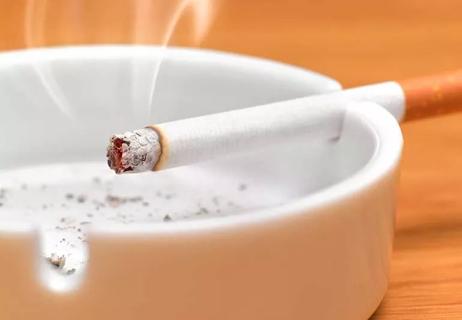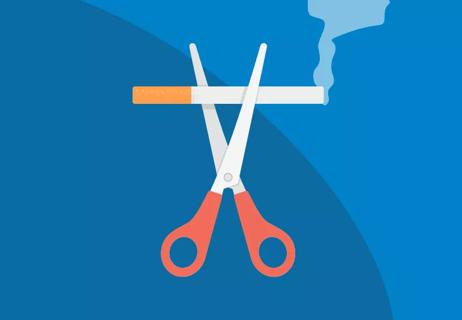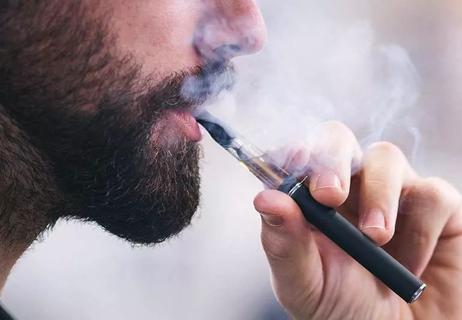Quitting vaping may not come easily, but it’s important to give yourself grace and patience

No one is surprised to hear that smoking cigarettes is bad for your health. Decades of Surgeon General warnings and terrifying public service announcements (PSAs) have really made that point loud and clear.
Advertisement
Cleveland Clinic is a non-profit academic medical center. Advertising on our site helps support our mission. We do not endorse non-Cleveland Clinic products or services. Policy
But what’s been less clear is the guidance on vapes (or e-cigarettes, mods, Juuls® or whatever you choose to call electronic pens that deliver nicotine and other products without a lighter).
So, let’s get that out of the way first: Hands down, vaping is not a safe alternative to smoking cigarettes. Period. Hard stop.
True, there’s a wide range of nicotine-containing vaping pods (or e-liquids, vape juice or whatever you choose to call the cartridges that hold the chemicals used by a vape). And those pods have varying contents. Some have more nicotine, some have less, some are fruit flavored, some you can manipulate to add in other ingredients. But none of them are without significant risks to your health, including the high probability of nicotine addiction, says pulmonologist Humberto Choi, MD.
“Vaping addiction is treated the same as a nicotine addiction in people who smoke cigarettes because, at the heart of it, that’s what it is,” Dr. Choi says. “When you vape nicotine products, you’re being exposed to nicotine throughout the day. We know that nicotine is a highly addictive chemical. For most people, it’s not easy to quit.”
We talked with Dr. Choi about the dangers of vaping and nicotine addiction and got his advice on how to kick the habit. (Separately, some vape products are used to smoke marijuana. The recommendations for quitting those products would be similar to these ways to quit smoking weed.)
Advertisement
Vaping nicotine products come with some of the same risks as smoking cigarettes. Both vaping and smoking are addictive and bring potentially dangerous chemicals into your body. While cigarettes have been studied extensively for decades, vaping is relatively new — they were first sold in the U.S. in about 2007. So, the long-term effects of vaping on your health still aren’t known for sure.
But some of the known dangers of vapes include:
Another known effect of vaping is a serious lung condition called EVALI (e-cigarette, or vaping, product use associated lung injury), which sent thousands of people who used vapes to the hospital in 2019 and 2020. The outbreak was mostly associated with people who used vapes containing THC (the psychoactive compound in marijuana that makes people feel “high”), but EVALI can develop in people who use nicotine vapes as well.
When you go to the gas station and see that wall of different kinds of cigarettes behind the counter, it’s fairly well understood what’s in them. The boxes may have different logos, but they’re all tobacco products that contain nicotine and other chemicals.
E-liquids used for vaping, however, are much more varied, making it harder for scientists to weed out what’s in each of those little pods and what effects they can have.
Further complicating matters, the internet is full of “advice” from the vaping community with hacks to DIY your own e-liquids by adding alcohol, flavors, vitamins and other ingredients. And in case you’re wondering, manipulating your own e-liquids isn’t recommended, Dr. Choi says.
“It’s really hard to track exactly what substances are being used in e-liquids, and when people are trying to create their own e-liquids, it can make things even more dangerous,” he adds.
Addiction to nicotine is the most pressing danger of vaping, states Dr. Choi. This is particularly true because vaping can be done discreetly and without some of the restrictions put on smoking cigarettes.
“The number one concern is nicotine addiction,” Dr. Choi explains. “The content of one e-liquid cartridge can be the same as a full pack of cigarettes. And because vaping doesn’t require you to light something up and step outside, people can use it continuously throughout the day. You can easily go through a full cartridge in a very short time and be exposed to a very high concentration of nicotine.”
So, you might be thinking, “OK, maybe I vape, but that doesn’t mean I’m addicted”— the ol’ “I can stop whenever I can want” mentality. Let’s look at the signs of nicotine withdrawal to see.
Advertisement
When you stop using nicotine products (or are in between uses), a person with nicotine addiction may experience:
| Mood and behavior changes | Physical symptoms |
|---|---|
| Urges or cravings for nicotine.This is the most common symptom. | Headaches. |
| Feeling anxious, jumpy, irritable, grouchy or angry. | Nausea. |
| Feeling frustrated, sad or depressed. | Dizziness. |
| Trouble sleeping. | Increased appetite and weight gain. |
| Trouble concentrating. | Constipation, gas or diarrhea. |
| Cough, dry mouth, sore throat and nasal drip. | |
| Mood and behavior changes | |
| Urges or cravings for nicotine.This is the most common symptom. | |
| Physical symptoms | |
| Headaches. | |
| Feeling anxious, jumpy, irritable, grouchy or angry. | |
| Physical symptoms | |
| Nausea. | |
| Feeling frustrated, sad or depressed. | |
| Physical symptoms | |
| Dizziness. | |
| Trouble sleeping. | |
| Physical symptoms | |
| Increased appetite and weight gain. | |
| Trouble concentrating. | |
| Physical symptoms | |
| Constipation, gas or diarrhea. | |
| Physical symptoms | |
| Cough, dry mouth, sore throat and nasal drip. |
These changes (and more) happen because nicotine binds to receptors in your brain to release the chemical dopamine, the “feel-good hormone.” When you take away the nicotine, you release less dopamine, which can negatively affect your mood and behavior. Additionally, stopping the use of nicotine can upset certain chemicals in your body, leading to the physical effects of withdrawal.
A desire to quit using nicotine is an important and necessary first step. And you deserve a hearty congratulations for your commitment to quitting. (Your body — and wallet — will thank you for it!)
The ways to quit vaping are similar to the recommendations for ways to quit smoking, including:
Dr. Choi stresses that talking to a doctor about your addiction and your goals can be helpful.
Advertisement
A doctor can help you find the best methods for treating your dependence. For teens and young adults, nicotine replacement therapies, like patches, lozenges and gums, are the primary treatments recommended. For adults, certain medications can also be prescribed to help kick the habit.
In addition to physical tools, there are social and mental aspects to vaping. Understanding your triggers and why you vape in the first place can help you give up the vape for good.
“An important part of your quitting journey can come down to understanding why you vape,” Dr. Choi says. “Sometimes, we have to go deeper and see what’s going on. Some people use vaping to self-medicate their anxiety or depression. Or are you trying to use vaping as a way to ‘fit in’? Knowing why you started vaping in the first place can help you overcome any underlying issues and increase your chances of success.”
There isn’t a specific timeline that works for everyone when they choose to quit vaping. No two people will have the same experience quitting nicotine vaping. How long it takes you to quit will likely depend on a number of factors, including:
Advertisement
“My best advice for someone who is quitting vaping is to be patient and give yourself some grace,” Dr. Choi advises. “Quitting is a process. Nicotine is highly addictive. It may take you a few attempts, and that’s OK. Try again. And don’t hesitate to reach out for help.”

Sign up for our Health Essentials emails for expert guidance on nutrition, fitness, sleep, skin care and more.
Learn more about our editorial process.
Advertisement

Vaping exposes you to thousands of chemicals, including many that are known to cause cancer and lung disease

Smoking can make symptoms from cancer treatment worse, and can even make treatments less effective

From dental diseases to cardiovascular problems, the harmful effects of smoking hookah have plenty of downsides for your health

Even only a couple cigarettes a day can lead to potentially deadly lung diseases like COPD and emphysema

Your risk goes down once you quit, but you may still need a lung cancer screening

Cigarettes increase your risk of developing the condition and worsening its effects

Health benefits start within 20 minutes and continue to grow for years after

Each comes with substantial health risks and should be avoided

Even small moments of time outdoors can help reduce stress, boost mood and restore a sense of calm

A correct prescription helps your eyes see clearly — but as natural changes occur, you may need stronger or different eyeglasses

Both are medical emergencies, but they are very distinct events with different causes